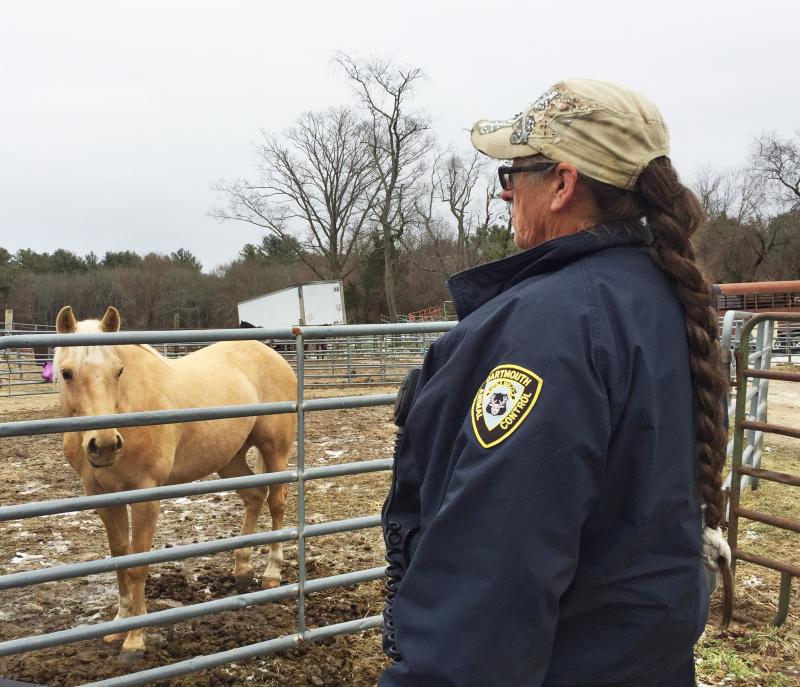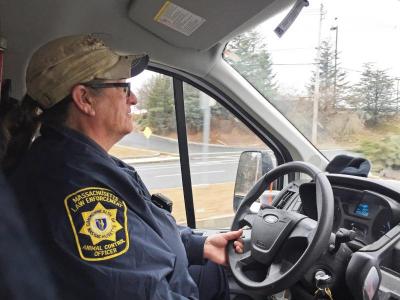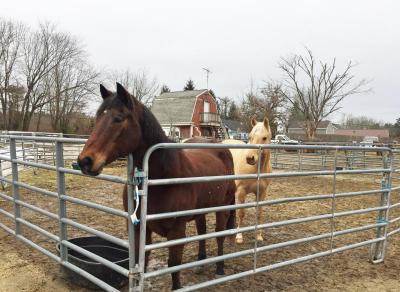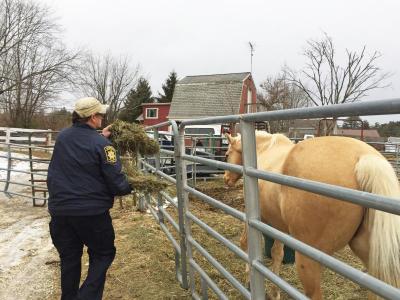Animal control unleashed: Extraordinary tails from 25 years in town
Sandra Gosselin’s van has clearly been around the block.
Along with the usual doodads and change, there’s a chewed-up tennis ball that rolls around the dash every time she makes a turn, as well as bags of treats, thick gloves, a cup full of pens and pencils, nets, poles, and a makeshift filing system for a stack of forms. In the back, cages rattle.
Gosselin has been the Dartmouth Animal Control Officer for the past 25 years.
“You don’t find too many animal control officers that last in this job for a lot of years,” she said. “It’s actually a pretty high burnout job.”
“It’s the stress,” she explained. “You see a lot of sad things, and some things you just don’t have any control over. The law is the law, and as much as you want to change something, sometimes the laws don’t allow you to change them.”
“It’s a tough situation when you are seeing animals dying or dead or abused,” she added. “And we see all of that.”
Some of the cases have stuck with her, including a recent case in which a calico cat they called Pumpkin Pie was found tied up in a rope that had cut deep gashes into its neck and leg.
Others are comical, like the time Gosselin got a call about a bison on Reed Road. The police asked her “Um, yeah. Do we have buffalo?...Because I just got a call from somebody who says they have a buffalo in their backyard.” The buffalo was called Mrs. Beezly, and was soon secured.
Or the time that emus got loose. “Those are real fun to try and catch,” she said sarcastically. “You’ve gotta corner it, and then you’ve gotta jump on it, and wrap your arms around it.”
But many cases are tragic, like a case of long-term starvation from years ago. “There was a gentleman on Horseneck Road, and he had livestock animals...Cows, goats, sheep, horses. He would feed them just enough. He had cows that looked like they were six months old when they were three years old.”
It took “many years” for the state to intervene, she said.
Another man kept hundreds of chickens in dog kennels. “They started to die, and there were literally dead ones in the cage with live ones,” Gosselin remembered. “And it was survival of the fittest.”
“After that, I was there every week,” she said. “He said to me one day, he says ‘What’s it going to take for you to not come here any more?’ And I said ‘The day you start taking care of your animals is the day I’ll stop coming back.’ He died before that happened.”
Back then, Gosselin said, animal cruelty was just a misdemeanor. Nowadays things are better. “Everybody’s eyes are opened up now,” she said. “And it’s a felony now.”
But prosecuting animal cruelty cases is still tough. “Let’s face it — the court system’s pretty busy,” Gosselin said. “It’s not important to them.”
That’s why, she noted, you often see people get a slap on the wrist for an animal cruelty charge.
And animals have to be in a really bad condition before the cases can be prosecuted at all.
Gosselin said, “it has to be something that you feel that you’re going to get somewhere in court with.”
Part of the problem is that animals are costly to keep — especially livestock. And if the owner doesn’t surrender the animal for adoption, the town or organization has to hold the animal for what could be years while the case wends its way through the court system.
Taxpayers foot the bill for the animal’s needs — including any vet care — during this time.
“Not to mention the life that the animal has sitting in a shelter waiting to see if something happens,” Gosselin added.
The life-long Dartmouth resident started off as a rabies control agent for the town in the 1990s.
“It was only supposed to be a temporary part-time job,” she laughed. “That turned in to close to 40 hours a week for two years.”
Every morning she checks the messages on the voicemail, and if nothing urgent comes up she cruises around town making house calls for inspections or permits or looking for loose dogs.
She also listens to the police radio in case they need her assistance, and checks the voicemail every hour or so.
“It all depends on the day, it depends on how busy it is,” she noted. “Every day is different.”
Her calls are usually evenly spread between livestock, pets, and wildlife. As someone who has grown up raising livestock animals, Gosselin said, she prefers them to people.
“Honestly, I’d rather go chase two 300-pound pigs down the street than go deal with somebody that has left their dog in their car while they went shopping at Wal-Mart,” she said.
“Because it’s easier for me to deal with those two pigs than it is to deal with that person who thinks it’s okay that they have left their dog in the car on an 85-degree day.”
“I can’t handle people not taking care of their animals,” she added. “If you can’t take care of them, get rid of them!”















